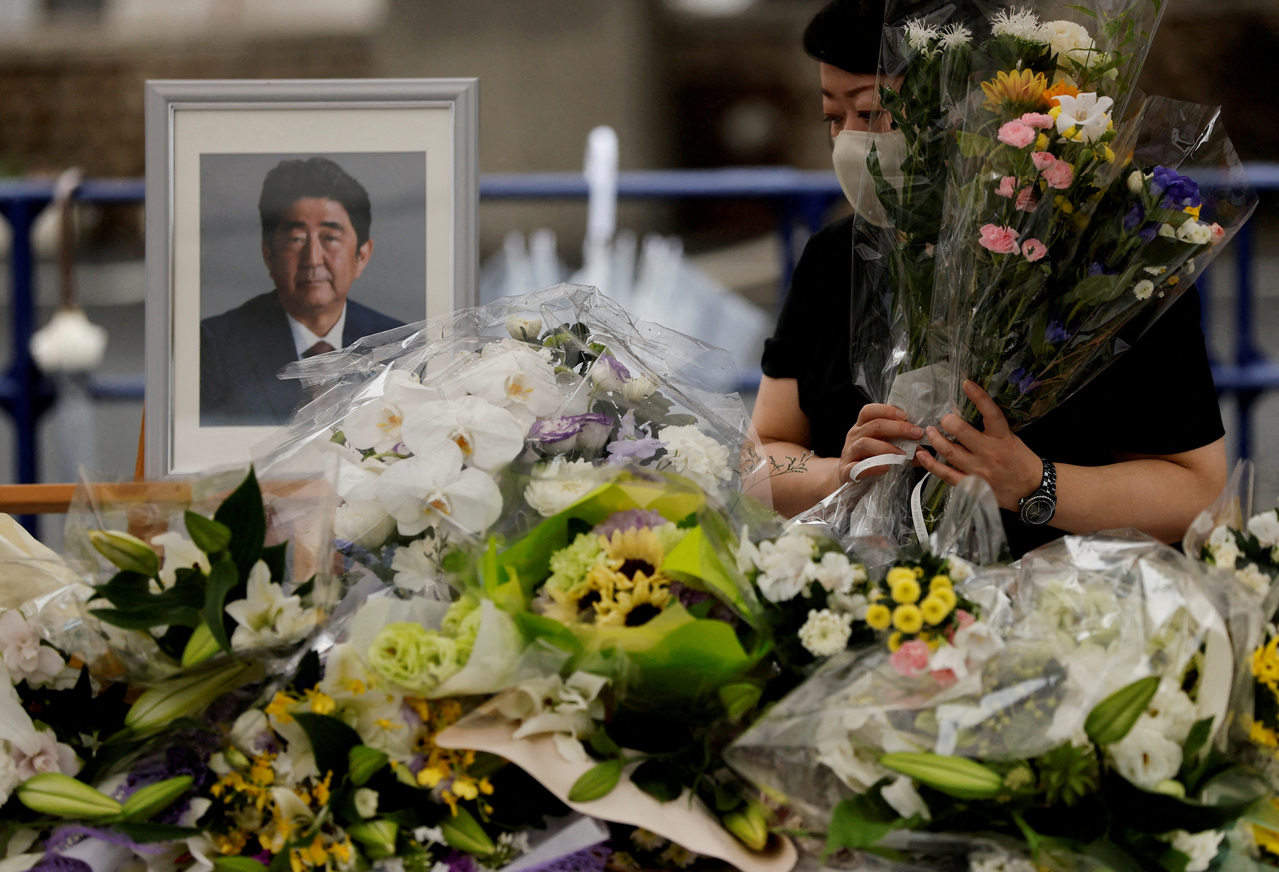Japan approves $2.5 million budget for controversial Shinzo Abe state funeral
Sign up now: Get insights on Asia's fast-moving developments

The government of Prime Minister Fumio Kishida decided the state funeral would be paid for solely with state funds.
PHOTO: REUTERS
TOKYO - Japan's Cabinet approved on Friday (Aug 26) a price tag of 249 million yen (S$2.5 million) for a controversial state funeral next month for former prime minister Shinzo Abe.
The final bill, however, will be higher because the approved sum covers only venue and transport logistics, as well as at least one separate venue for the public to offer flowers, but not costs to provide security for VIPs.
Some 6,000 guests are expected to attend the Sept 27 event at the Nippon Budokan arena. They include French President Emmanuel Macron, United States Vice-President Kamala Harris and Indian Prime Minister Narendra Modi. Russian President Vladimir Putin will not attend.
Public opinion polls by newspapers across the political divide have shown one consensus: A majority of the Japanese public are against the state funeral for Mr Abe, who died on July 8 after he was shot by a lone gunman at an election rally.
Chief Cabinet Secretary Hirokazu Matsuno stressed on Friday: "We note that there are varying opinions about the state funeral. Ordinary citizens will not be expected to mourn Mr Abe, nor extol the government."
Tokyo is not asking public agencies, local governments and education boards to fly the flag at half-mast or observe a minute of silence. The date will also not be a national holiday.
The suspect, 41-year-old Tetsuya Yamagami, who is undergoing psychiatric assessment, said he targeted Mr Abe, not for his political views but for his alleged ties with the Unification Church, a South Korea-founded religious group known for its coercive measures and which has been described as a "cult" in several countries.
Yamagami, who watched an online video message by Mr Abe to an affiliated group of the Church, said his mother went bankrupt after she joined the church and was brainwashed into making excessive donations.
The state funeral will be only the second one for Japan after World War II, following the one in 1967 for former prime minister Shigeru Yoshida who led from 1946 to 1947, and then from 1948 to 1954.
Other funerals, like a 190 million yen service in 2020 for former prime minister Yasuhiro Nakasone, who led from 1982 to 1987, were held jointly with the ruling Liberal Democratic Party (LDP). The state and the party split the bill.
The idea of a state funeral - which is fully paid for by taxpayers - for Mr Abe has been controversial for several reasons.
A state funeral is a relic of Japan's imperial history, with a decree stipulating that citizens should mourn. The ordinance expired when the post-war Constitution was enacted in 1947.
An online petition was started on Tuesday (Aug 23) by 17 observers, including University of Tokyo professor emerita and prominent sociologist Chizuko Ueno, calling for the state funeral to be cancelled as it is unconstitutional.
The petition argued that the state funeral not only violates the guarantees for freedom of thought and conscience among the people, but also lionises Mr Abe, which is inappropriate, given the apparent "collusion" between politics and religion.
Nearly 60,000 signatures have been collected so far.
Mr Abe was also a divisive politician domestically, in contrast to his global stature as a statesman who raised Japan's international profile and brought the term "Indo-Pacific" into the diplomatic lexicon.
While Mr Abe may have been Japan's longest-serving prime minister, Doshisha University political scientist Toru Yoshida noted how he had "benefited" from a weak opposition. His tenure was clouded by cronyism scandals that created an aura of opacity and complacency in his government.
Another reason for the controversy is that unlike the state funeral for Mr Yoshida which was held just 11 days after his death, more than two months have elapsed since Mr Abe's death, said Dr Sota Kato, a research director at The Tokyo Foundation for Policy Research think-tank.
Public grief has not only subsided, but also turned into anger after "too many political elements have become involved", he said, pointing to the alleged deep links between the Unification Church and the LDP that have led to a backlash in public opinion.
A slew of lawmakers from the LDP and other opposition parties have come clean on their ties with the church in the form of donations, recruiting church members as volunteers in election campaigns, or speeches at church events.
Amid the feverish media reports this week was one that cited LDP policy chief Koichi Hagiuda as having once told a Unification Church event: "Let's work together to make Japan a country of God."
Prime Minister Fumio Kishida, whose Cabinet saw its support fall by 16 points to 36 per cent in a poll by Mainichi newspaper last week, said on Wednesday that LDP politicians must hold themselves to the highest standard and disavow all ties with "anti-social groups".
The LDP is set to announce next Friday the outcome of an internal probe of its lawmakers' links to the church.
Meanwhile, National Police Agency commissioner-general Itaru Nakamura, the agency's security bureau head Kenichi Sakurazawa, and Nara prefectural police chief Tomoaki Onizuka tendered their resignation on Thursday after an internal probe found lapses that had led to Mr Abe being gunned down.
A police probe on Thursday blamed two shortfalls - poor planning and inadequate on-site security - in concluding that the assassination "highly likely could have been prevented".


